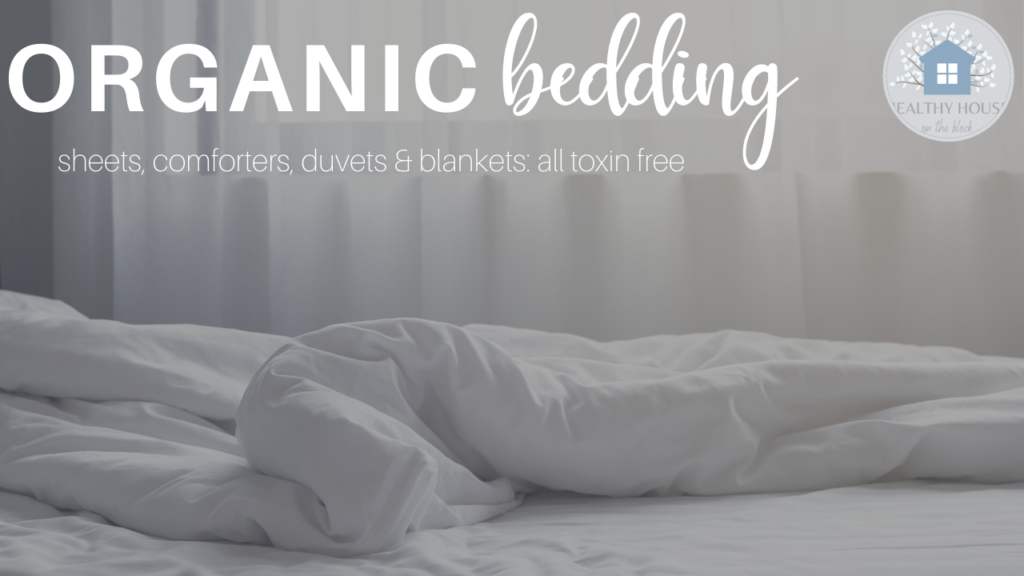
One of my favorite places to start with families who want to transform their homes is to start where they sleep. Our bedrooms and our kids’ bedrooms can be such a supportive space for our health and wellness. In fact, at the Institute for Building Biology, we refer to it as a sleep sanctuary. This covers the mattress, pillows and of course organic bedding.
I have come to absolutely love this phrase as it really speaks to just what our bedrooms could have potential for: restoration and healing. When we sleep our body works in a different way to finish up all the work from during the day. Our brains, muscles and systems have time to detox, heal and get ready to start another day.
By keeping our beds and bedrooms in line with low toxin living, it gives our bodies a break from the toxin overload we can experience throughout the day. We know that proximity to a toxin and length of exposure are often two of the key factors in how our bodies are affected by what’s around us.
This is why organic bedding really does matter in terms of creating a healthy space at home. It’s also why I think it’s such an excellent place to start when you begin cutting out toxins in your home and life.
As always, I love sharing more than just what my top picks for organic sheets are. Instead, I want to share with you
- Why toxins matter in our sleeping spaces
- The toxins that are in most of our conventional bedding
- How to find organic sheets and toxin free bedding
- The brands I trust for organic bedding
It can be a bit of an investment right away, but there are so many ways you can slowly swap out bedding for toxin free alternatives. That’s the beauty of knowing just HOW to find toxin free bedding; you can purchase things on sale when you see them if you know what you’re looking for.

WHY TOXINS IN BEDROOMS SHOULD BE AVOIDED
As I mentioned before, two of the biggest factors that come into play when it comes to toxin exposure is the proximity to a toxin as well as the length of time we’re in contact with that toxin. Sleeping for 6-8 hours a day on a toxin like formaldehyde or pesticides is a long exposure and chances are your body is in direct contact with those toxins.
A while ago I shared a blog post with you all about the three main ways we’re exposed to toxins on a daily and almost constant basis. The idea is that we are exposed through the toxins we ingest, the toxins that are touching our skin and the toxins we inhale. Any toxin we are exposed to in more than one of those ways automatically makes it a toxin that can be difficult for our bodies to get rid of through the natural detoxification process.
Our bodies naturally detoxify throughout the day, constantly. But what happens when we are in contact with more toxins than our body can get rid of? That’s when the idea of body burden comes in. Body burden is when our systems (such as our gut, immune or hormones) can’t function properly because they are constantly under the burden of toxins.
Imagine our body trying to detoxify while we sleep (this is PRIME time for our bodies to naturally detox). We have no food coming in and no external toxin exposure, so our bodies can work on the toxins that have entered our body throughout the day. Our bodies can truly restore and you can start the next day fresh with a system that has been mostly cleansed.
By keeping our sleeping spaces free from as many toxins as possible, it makes this scenario possible. Obviously there are other factors that can come into play, making this detoxification process a bit more tricky. For example if you have had mold exposure, it can halt the natural detoxification process. But overall, this is the idea behind keeping our sleeping sanctuary just that: a place to let our bodies heal and restore.
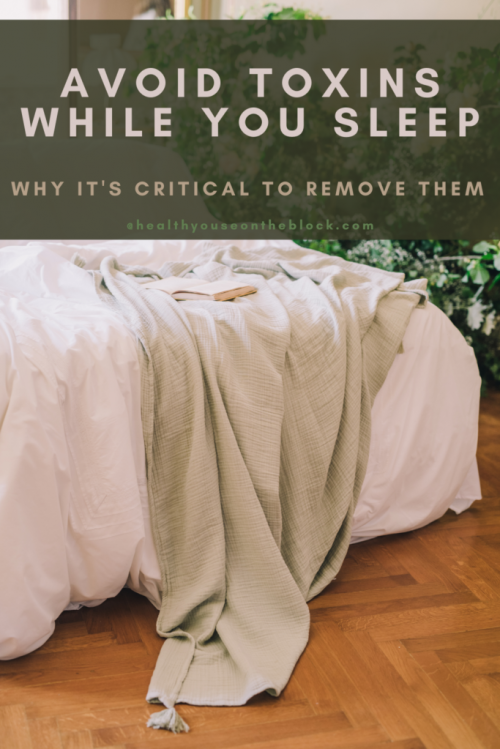
TOXINS IN MOST BEDDING
Conventional bedding often has a number of toxins present that we haven’t even thought about. You may think you’re just buying a set of sheets, but really what you’re getting could potentially have more toxic components.
Formaldehyde: If your sheets or blankets are advertised as wrinkle free, chances are they’ve been treated with formaldehyde. Formaldehyde and other chemicals are embedded into fabrics to make them resistant to not only wrinkles, but also stains and liquids. Any sheet, blanket or bedding that advertises some sort of “super power” like stain resistant, moisture wicking or wrinkle free is a red flag to look into the product. Formaldehyde is a known carcinogen and off-gasses, meaning it’s a toxin we inhale as well as absorb.
Bleach: Bleach contains the chemical chlorine in order to whiten and disinfect. BEdding that is stark white has the potential for being treated with chlorine bleach to get the fibers bright and beautiful. Chlorine is one of those toxins that we come into contact with throughout the day, and our bodies can become overwhelmed and burdened by it. It’s been linked to an increased risk for asthma and allergies in children and an increased risk of melanoma and skin cancer.
Pesticides: Even if you’re purchasing plain old cotton sheets, chances are the cotton grown to make those sheets has been treated with pesticides. I wrote about pesticides not too long ago and I shared just how many places in your home pesticides are found. We’re exposed almost constantly with our clothing, textiles and of course our bedding and sheets. Pesticides in our homes and textiles have been linked to an increased diagnosis of ADHD in children, increased risk of childhood cancers, and an increased risk for developmental defects and stillbirths. In adults, it has been linked to Parkinson’s Disease, altered hormone production and endocrine function as well as reproductive problems.
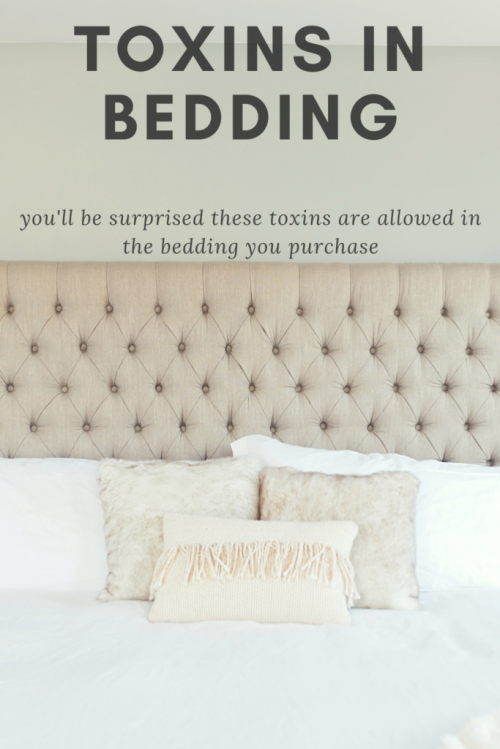
Heavy Metals: So often sheets come in a variety of beautiful colors and designs. Unfortunately, some of the conventional sheets you may find use heavy metals in the production of pigments. These heavy metals include both cadmium and lead, which are both toxic to our bodies. These heavy metals build up within our systems as our bodies take longer to detox the toxin. Children have an especially difficult time detoxifying from heavy metals, and so it’s best to avoid them all together. Sheets that have rich and bright colors should be double checked before purchasing. These heavy metals are not only harmful to our bodies, but also the environment and wildlife that experiences the run-off from production.
Microfiber: Those brushed microfiber sheet sets might feel super soft, but microfiber is made up of polyester and other man-made materials that release VOCs like formaldehyde into the air as well as phthalates. Essentially, you’re sleeping on tiny particles of plastic. I talk about phthalates and plastic a lot because it’s a toxin we’re constantly exposed to in our homes. And it’s a toxin we can work hard to reduce wherever possible. PHthalate exposure has been linked to reproductive issues and neurological toxicity in both kids and adults. It’s also a HUGE endocrine disruptor which in turn affects the thyroid function, immune system and reproductive system. Phthalates have also been linked to lower IQ in children, problems with attention and hyperactivity as well as poor social communication. But the biggest problem is microfiber, because it’s a type of plastic that NEVER breaks down. It’s staying in our bodies and environment for extremely long times and affecting our ecosystem and our bodies negatively for years and years after use.
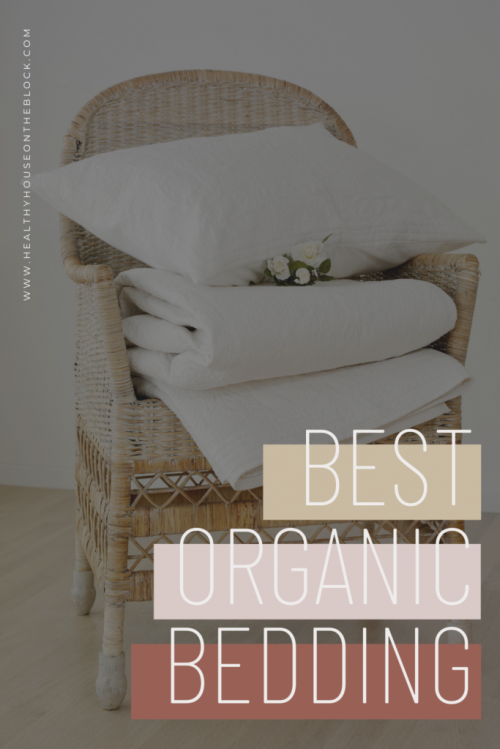
HOW TO FIND TOXIN FREE BEDDING
I think that the best way to find toxin free bedding is to look for organic sheets, organic blankets and organic comforters. That being said, not all organic is the same. Here’s what you need to know about each certification that you might run across while shopping for organic bedding:
Global Organic Textile Standards (GOTS) is one that makes sure dyes and inks comply with biodegradability and toxicity requirements. GOTs also makes sure that products do not contain any allergenic, carcinogenic or toxic chemical residues. Finally, they also certify factories have a high functioning wastewater treatment plant to ensure it protects local ecosystems and water supplies.
Organic Content Standard (OCS or OE) is another great third party verification that checks the products to make sure they contain the proper amount of organically grown materials. This certification doesn’t necessarily address the use of chemicals or environmental aspects of a product, however.
Oeko-Tex Standard 100 does independent testing and certification to verify textiles at all stages of production. They look at the raw and dyed fabrics, finished fabrics and knits as well as ready-made fabrics. The testing they provide focuses on the intended use of the textile and how much skin contact the fabric will have.
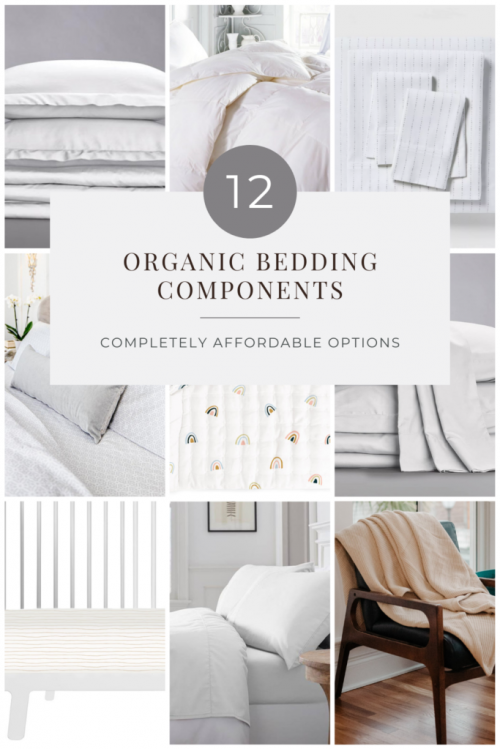
TRUSTED BRANDS
I have looked high and low for sheets and bedding for my whole family. From our king size bed to my little one’s crib, I was able to find brands that I 100% trusted for organic sheets and organic bedding.
(Click the images below to shop)
As you go about creating your healthy home, consider making some permanent changes to your bedding and bedroom. Switching to organic bedding, organic sheets and blankets can be an investment at first, but you’re investing in your health and wellness and creating a healthier space at the same time.
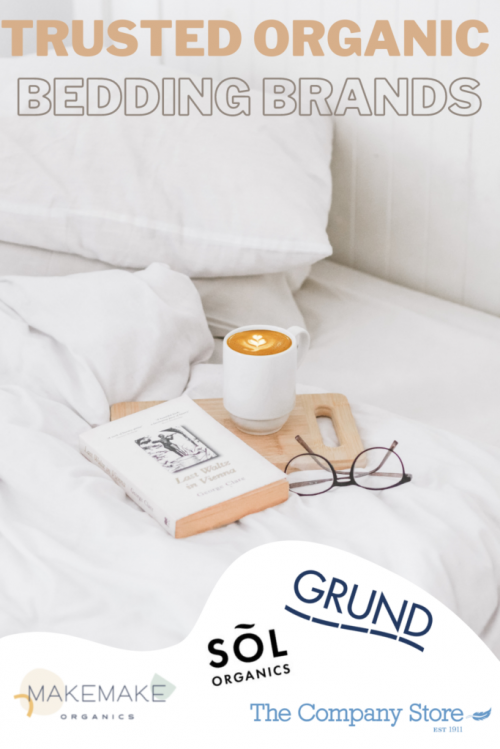





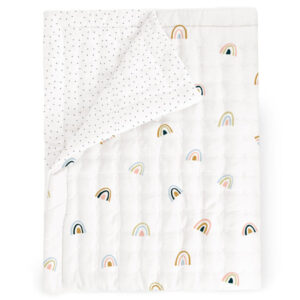





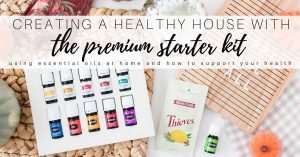


Wow! I had no idea! This is a great educational post on organic bedding! Thanks for sharing that! I am now inclined to get the right kind for me and my family!
Thank you! I’m glad it’s so helpful 🙂
So I randomly ordered a 100% dye free linen duvet cover and it is heaven. Since then as things have been wearing out I have been replacing everything with linen. It is my favorite!
That’s awesome!! I have loved slowly replacing everything that wears out too 🙂
Where did you order from?
I didn’t know there was so many different organic bedding options. This is great and super useful for people who have skin irritation from normal beddings. Thanks!
Thank you! I”m glad this is such a helpful list!
This is completely new knowledge for me. I did not know about organic bedding. Sleeping is so important for me, I would not mind invest in organic bedding.
Sleep is really important to me too 🙂 I’ll try just about anyway I can to get more sleep at night!
We just recently got new mattresses for everyone when we moved, but the next time we need one I want to get a better mattress that’s organic like this. I’ll have to keep this in mind because I didn’t know there were so many things to look for to make sure it’s all natural.
Isn’t it amazing the number of home items that are all natural now!? It’s exciting to see how many ways we can improve our indoor environments!
I have had the same sheets for about seven years. They are just the standard sheets but they do a good job.
We are in the market for some new bedding! Going to check this out1
That’s great, Neely!
I can’t believe I have never looked closer to my linen and I totally ignored the fact that there could be harmful chemicals in my sheets! I will be checking the labels very carefully from now on! Thank you so much for these great tips!
You’re welcome! Even Target’s Pillow Fort Brand offers certified sheets that are 100% cotton for kids. It just takes knowing what to look for 🙂
I’ve heard such great things about Bill & Branch. When I replace my current bedding, I think that’s where I’ll go.
That’s great, Christa! Their sheets are of really high quality and their business does some amazing things with their proceeds.
Oooo great tips! I always struggle with buying the right sheets! I always assumed the higher the thread count the better. That’s unfortunate not always the case though
Thanks, Courtney! Hopefully these brands will be a winner for you 🙂
Wow I did not know there was so much to know about organic bedding. We need some new bedding, so will have a look at this is more detail xx
Thanks, Melanie. I hope this helps!
Magnolia Organic is actually one of my favorite brands. I love that you stressed the importance of the sheets for a good nights sleep. People focus so much on the mattress and forget about the sheets.
Oh, you’re so right, Kristen! Glad you have a brand you love!!
I honestly had no clue about this! I will be looking out for these when I purchase new bedding! Thank you 🙂
I am attracted to natural and organic bedding products. I never knew about the wrinkle free. Definitely will be checking that out for now on.
Honestly I have never focussed too much on the sheets. But after reading this post, I will start paying more attention.
Thank you so much for the great information! I have actually been wanting to switch over to organic bedding but felt I didn’t know enough about it, but thanks to your post I know do! Thanks again! 🙂
That’s great, Nicole! I’m glad this helped!
Thanks so much for doing the research and creating this list! We had invested in an organic mattress and organic sheets for my daughter, but haven’t yet done the same for ourselves. Will look into the brands you have suggested!
Of course, Rachel!! Glad it was helpful!!
WOnderful job here.You know what?I like your writing style.I’m also a blogger and its so difficult sometimes.My time will come but I know I’m on the right path.PS.I’m gonna have to share this post!
Marvelous work here.I really like the way you explain things.PS.I’m gonna have to share this post!
Pingback: Sleep Sanctuary: Kids' Edition (the best way to fall asleep)
Pingback: Healthy Habits for Kids (how your home plays a role) »
Pingback: How to Decorate With Beautiful But Toxin Free Items